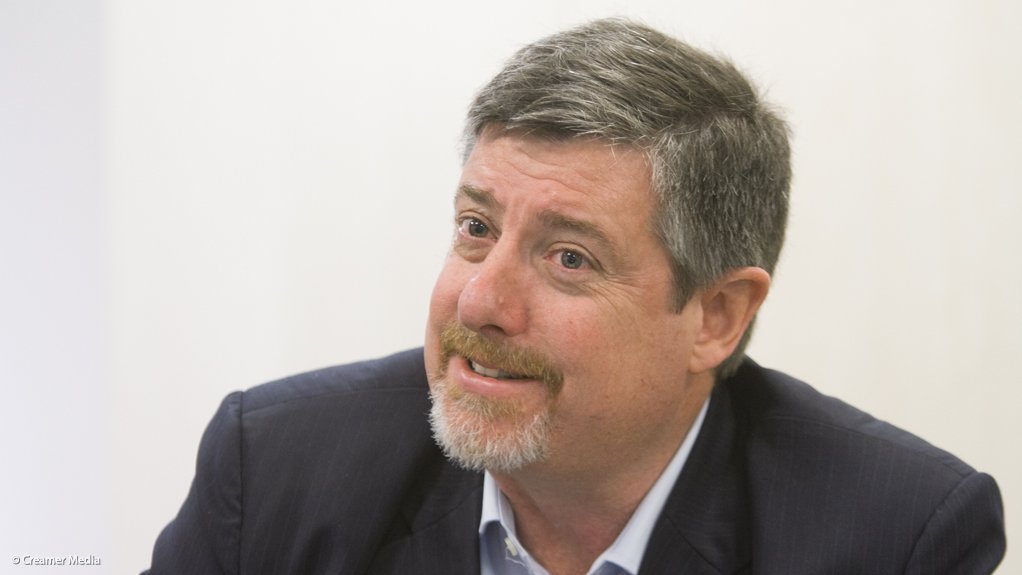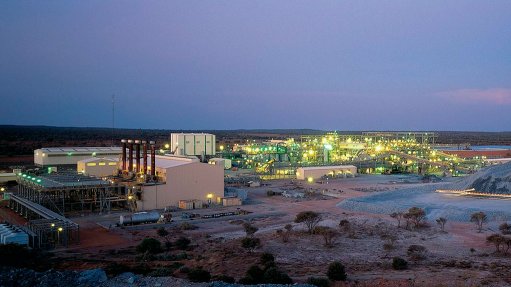National debate needed on ways to lower high rail costs – CoAL
JOHANNESBURG (miningweekly.com) – A national debate is needed to discuss ways of lowering the high cost of railing bulk commodities like coal, says Coal of Africa Limited (CoAL) CEO David Brown.
The London-, Sydney- and Johannesburg-listed CoAL plans to produce nearly seven-million tons of saleable product a year, more than five-million tons of it being import-substituting hard coking coal, which is used in steelmaking and which attracts a price premium.
Unlike the upcoming coal projects in the emerging Waterberg coalfield, CoAL’s resource base has access to existing railway infrastructure but an impediment is South Africa's “very expensive” cost of railing.
“To mine a run-of-mine (RoM) ton of coal costs in the order of R200/t all-in but to rail that to the coast will probably cost you R400/t.
“There’s something wrong there. It's out of kilter for your logistics costs to be twice your mining and processing costs.
“That’s something that, as a country, we’re definitely going to have to re-examine,” Brown comments to Mining Weekly Online.
CoAL plans to produce semi-soft coking coal and thermal coal from its brownfield Vele project in the short term, and both hard coking coal and thermal coal from its medium-term Makhado project and its long-term Greater Soutpansberg projects.
The company expects to be able to ramp production up to steady state sooner than the coal projects in the Waterberg coalfield and will also be able to save precious foreign exchange by substituting the importation of expensive hard coking coal.
CoAL believes that it can play a pivotal role in lowering the cost of inputs into the local production of steel, which is poised to be expanded following the signing of a memorandum of understanding by Hebei Iron and Steel Group of China and South Africa’s State-owned Industrial Development Corporation for the development of new steelmaking capacity in Limpopo province, where CoAL, which is also Chinese-backed, has its projects.
Steelmaker ArcelorMittal South Africa and State electricity utility Eskom have both approved the quality of the coals to be supplied.
Brown advocates a strategic review of the cost effectiveness of moving coal from where the resources are to where the coal is needed, which Eskom will have to do increasingly as its Mpumalanga power stations outlive the depleting Mpumalanga coalfields.
With take-or-pay arrangements being implemented by State rail company Transnet, Brown also calls for take-or-pay flexibility during lower commodity pricing environments and a claw back when there is higher pricing.
Transnet this week signed its first long-term R24-billion take-or-pay agreement with a domestic coal exporter BHP Billiton Energy Coal South Africa (Becsa).
The take-or-pay nature of the contract commits Transnet Freight Rail to provide trains as contracted, or face financial penalties, and Becsa to pay for the service as contracted, whether or not it has coal to rail.
Transnet CEO Brian Molefe has disclosed that negotiations are under way with 28 other coal exporters to sign similar take-or-pay agreements by November.
“What we’re seeing at the moment is not necessarily that ports are that expensive. Transnet is the impediment,” says Brown, who calculates that rail transport represents about 65% to 70% of the logistics cost and the port probably about 20%.
Having operated Vele for some time prior to its reconfiguration, CoAL has a proven track record of exporting along the Maputo Corridor to the Matola terminal in Mozambique, where it has an export allocation of three-million tons a year as well as the right to participate in the port's expansion, which adds another string to its bow.
CoAL could also transport its products by road, as all its projects are close to good existing national road infrastructure.
Rail from the Waterberg, as the next major coalfield, is being pushed hard at the moment.
“In part, that will help to put the debate on the table,” he adds.
If rail costs are not brought down, Eskom will be forced to charge even more for electricity until power stations are built closer to the emerging coalfields.
“There is a distinct need for Eskom to get a strategic thought process going for us to map out a supply future for Eskom and, certainly, I think that the Soutspansberg coalfield will be one of those solutions,” Brown adds to Mining Weekly Online.
The Soutpansberg is said to represent more than 90% of South Africa’s accessible hard coking coal resources and about 10% of total remaining domestic resources.
CoAL will be able to introduce 2 500 jobs into the economically under-developed Limpopo during the construction phase of the Makhado project and 1 100 permanent jobs once in steady state.
The 26-month construction of the Makhado plant at a cost of $400-million is scheduled to begin in 2016 to allow production in 2018/19.
On the proposed Hebei steel plant, Brown says: “Quite clearly that would be a very positive development for us as a company and would allow us to find a user for our products in close proximity to the mines.”
Equity capital will fund the $23-million plant modification at the dual-product, 50-year Vele, which is expected to ramp up to 2.7-million RoM coal a year from the third quarter of next year.
An incoming strategic partner will be introduced to fund the full project equity requirement for Makhado, where CoAL will retain majority ownership in a part debt structure.
The proposed 16-year, opencast Makhado mine is being designed to produce 2.3-million tons of hard coking coal a year and 3.2-million tons of thermal coal a year.
The incoming strategic partner will hold 20% to 23% of the shares in the project company and the black economic-empowerment (BEE) shareholder 26%.
While 6% of the BEE holding is available as an employee share ownership plan, the percentage may also be used to create black industrialists in line with government aims.
Loss-making CoAL, which ended the 12 months to June 30 with cash of only $2.1-million, is about to raise up to nearly $65-million equity and receive $23-million from the sale of its noncore Mooiplaats colliery, which is expected to provide it sufficient working capital for the next 18 months at least, Investec Securities mining analysts said in a note..
Comments
Press Office
Announcements
What's On
Subscribe to improve your user experience...
Option 1 (equivalent of R125 a month):
Receive a weekly copy of Creamer Media's Engineering News & Mining Weekly magazine
(print copy for those in South Africa and e-magazine for those outside of South Africa)
Receive daily email newsletters
Access to full search results
Access archive of magazine back copies
Access to Projects in Progress
Access to ONE Research Report of your choice in PDF format
Option 2 (equivalent of R375 a month):
All benefits from Option 1
PLUS
Access to Creamer Media's Research Channel Africa for ALL Research Reports, in PDF format, on various industrial and mining sectors
including Electricity; Water; Energy Transition; Hydrogen; Roads, Rail and Ports; Coal; Gold; Platinum; Battery Metals; etc.
Already a subscriber?
Forgotten your password?
Receive weekly copy of Creamer Media's Engineering News & Mining Weekly magazine (print copy for those in South Africa and e-magazine for those outside of South Africa)
➕
Recieve daily email newsletters
➕
Access to full search results
➕
Access archive of magazine back copies
➕
Access to Projects in Progress
➕
Access to ONE Research Report of your choice in PDF format
RESEARCH CHANNEL AFRICA
R4500 (equivalent of R375 a month)
SUBSCRIBEAll benefits from Option 1
➕
Access to Creamer Media's Research Channel Africa for ALL Research Reports on various industrial and mining sectors, in PDF format, including on:
Electricity
➕
Water
➕
Energy Transition
➕
Hydrogen
➕
Roads, Rail and Ports
➕
Coal
➕
Gold
➕
Platinum
➕
Battery Metals
➕
etc.
Receive all benefits from Option 1 or Option 2 delivered to numerous people at your company
➕
Multiple User names and Passwords for simultaneous log-ins
➕
Intranet integration access to all in your organisation





















